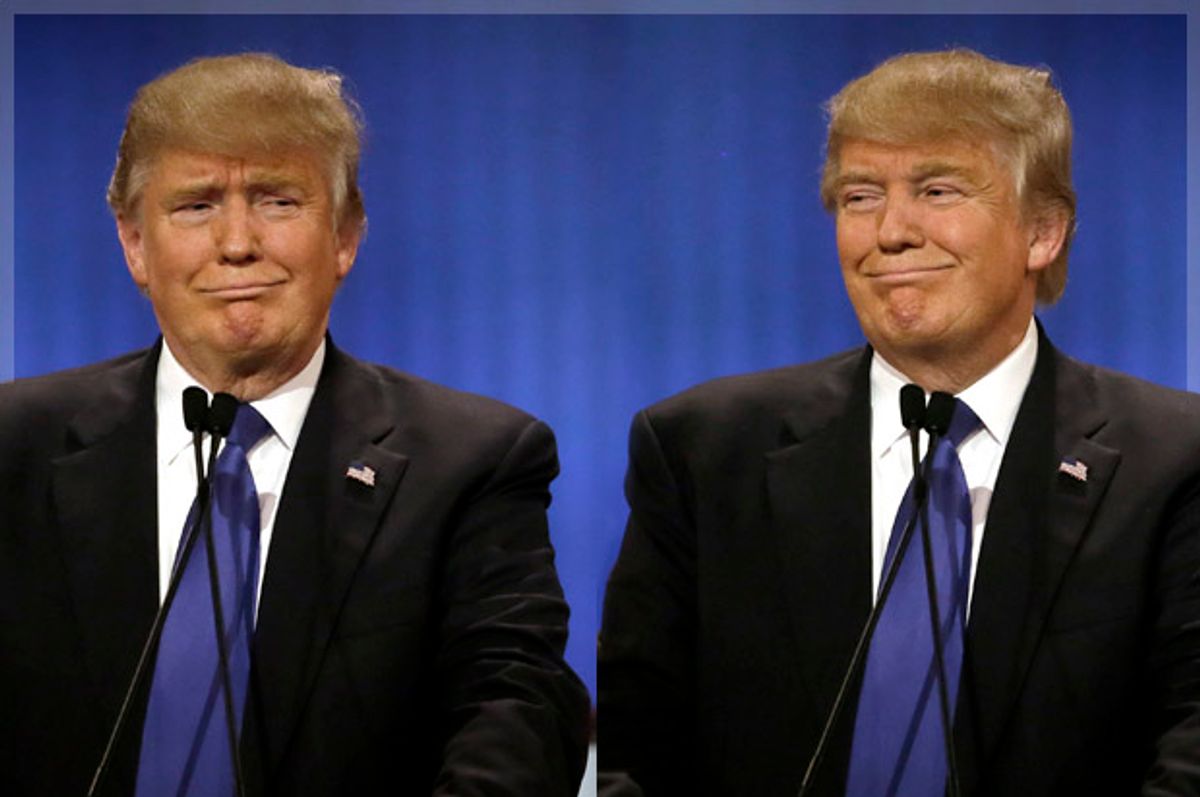Donald Trump became the presumptive Republican presidential nominee on Tuesday night, and he wasted literally no time in shedding some of the policy positions he laid out in the primary. He hasn’t exactly been the picture of consistency to date, and he’s built an entire political persona around erratic and unpredictable behavior, but the issues that Trump is flip-flopping on give some indication of how he views his own base and the sort of pitch he’ll make in a general election.
Before we get to the flips, let’s take a look at the issues Trump stood firm on since becoming the nominee-in-waiting. The morning after the Indiana primary, Trump went on MSNBC and stated in no uncertain terms that he would not back off his proposal to halt Muslim immigration into the United States. “I don’t care if it hurts me,” he said. “I’m doing the right thing when I do this.” Trump also stuck by his plan to build a giant wall on the border with Mexico, and he taunted former Mexican president Vincente Fox, telling him to “get your money ready, because you're going to pay for the wall.”
So the wall and the Muslim ban aren’t going anywhere. But on taxes and the minimum wage, Trump flipped and he flipped hard. The Trump tax plan, which you can read on his website, is a massive boon for the wealthy. According to the Tax Policy Center analysis of the plan, “the highest-income households would receive the largest cuts, both in dollars and as a percentage of income.” People at the bottom of the economic ladder would receive, on average, a $128 tax cut under Trump’s plan, while the top 0.1 percent would take home an extra $1.3 million. But on Thursday, Trump shied away from cutting taxes for the super rich. “I am not necessarily a huge fan of that,” he said on CNBC. “I am so much more into the middle class who have just been absolutely forgotten in our country.”
On the minimum wage, Trump spent most of the Republican primary railing against the minimum wage, saying at one point that “wages are too high.” Asked specifically about plans to raise the minimum wage to $15 hourly, Trump said “we cannot do this if we are going to compete with the rest of the world. We just can't do it.” But that was all thrown out the window this week as Trump said he was open to a minimum wage increase. “I’m actually looking at that because I am very different from most Republicans,” Trump said on CNN. “You have to have something that you can live on.”
What this shows is that Trump believes his core group of supporters are more invested in the cultural resentment portions of his platform than they are in Republican economic orthodoxy. He sees more power in motivating Republican voters through appeals to nativism, xenophobia, and anti-Muslim demagoguery, so he’s hanging on to those parts of the Trump platform and betting that GOP voters won’t care too much that he’s waffling on tax cuts.
The one flip Trump made that might actually do real damage among his core supporters is his reversal on self-funding. Trump’s primary campaign never was truly “self-funded” – he took in several million dollars in donations, and the majority of his money came in the form of loans to himself – but the image he projected of an independent candidate who would not be beholden to outside interests was a large part of his appeal. He railed against the corrupt campaign finance system, and, in a bit of bizarre Trumpian political kung-fu, offered himself as an example of that corruption. “When they call, I give,” he said at that first Republican debate. “And you know what? When I need something from them, two years later, three years later, I call them, they are there for me and that’s a broken system.”
But it turns out that running a national political campaign against the absurdly well-funded Clinton political machine is prohibitively expensive, even for a man of uncertain billions like Donald Trump. So he’s giving up on self-funding and putting together a fundraising operation and hiring Steven Mnuchin to be his campaign finance chairman. Who is Steven Mnuchin? He’s one of those “hedge fund guys” Trump rails against. And he worked for Goldman Sachs, the same bank Trump attacked Ted Cruz for taking loans from. And he used to be a donor to Hillary Clinton.
So with one sweeping gesture, Trump has undermined his claims to donor independence, ripped the floor out from underneath his pseudo-populist railing against Wall Street, and hampered his own ability to attack Clinton as a stooge of the big banks. That’s an impressive amount of self-inflicted damage for someone who’s been a presumptive nominee for less than half a week.

Shares